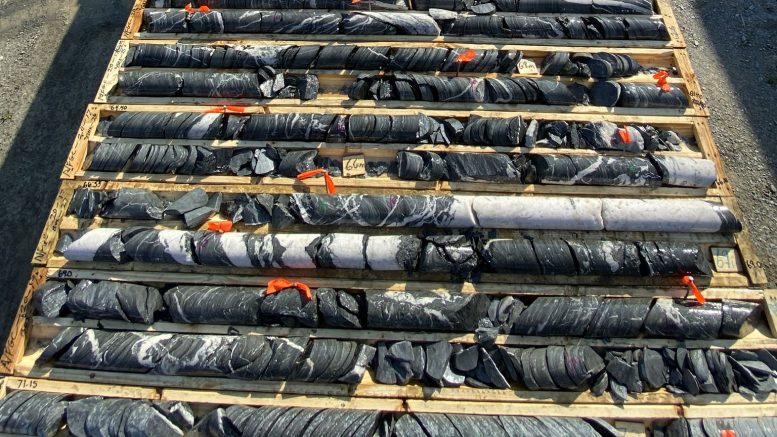New Found drills 69.15 g/t Au over 14.2 metres at Golden Joint, demonstrating width of high-grade vein


New Found Gold (TSXV: NFG) has released assay results from 23 diamond drill holes designed to expand the high-grade gold mineralization at the Golden Joint and Lotto discoveries, located within a 1-km segment of the Appleton fault zone (AFZ).
This corridor is part of more than 20 km of prospective strike along the regional-scale Appleton and JBP fault zones on the the company's flagship Queensway project in Newfoundland, where New Found Gold is currently in the midst of a planned 400,000-metre campaign. About 38% of the drilling is complete to date.
Currently there are 11 rigs on the Queensway property, which covers approximately 1,500 sq. km of land, about 15 km west of Gander. Results for 21,400 metres of core are still pending.
The latest assays included a highlight intercept of 69.15 g/t gold over 14.2 metres from Golden Joint, demonstrating continuity and significant width of the high-grade vein that is now defined over a strike length of 250 metres and to a vertical depth of 300 metres. The Golden Joint vein is located in the footwall to the AFZ, strikes approximately north-south, steeply dips to the west and is open in all directions.
At Golden Joint HW (hanging wall), the gold zone is defined by a network of stockwork-style veining that is largely hosted within and adjacent to a thick greywacke bed. It has now been defined over a strike length of 190 metres and to a vertical depth of 125 metres. There, the highlight interval of 13.35 g/t gold over 2.1 metres further defines the high-grade trend in the Golden Joint HW stockwork zone that strikes towards the east-northeast, dips moderately to the southeast and remains open in all directions.
At Lotto, the main high-grade gold vein has now been extended to a vertical depth of 225 metres with an intercept of 24.25 g/t gold over 2.2 metres and over a strike length of 200 metres. The Lotto main vein is located approximately 150 metres east of the AFZ, strikes north-south, steeply dips to the east and is open in all directions.
The Sunday target, situated between the main vein at Lotto and the AFZ, returned 23.08 g/t gold over 2.1 metres, 65 metres down-dip of the previously reported 18.1 g/t gold over 6.5 metres. This zone is located in the footwall to the AFZ, strikes approximately north-south, dips moderately to the east and, again, remains open in all directions.
"As drilling progresses along this segment of the Appleton fault zone, it is very apparent the role and importance of the AFZ as a crustal-scale thrust fault and likely source of the gold mineralizing fluids. All rocks in close proximity to the AFZ have the potential to host high-grade gold mineralization," Melissa Render, VP of exploration, commented on these results.
"It is important to note that the high-grade gold sits in structures adjacent to the AFZ within a damage zone that presents as a network of gold-bearing faults. Although the structural setting is complex, it is this complexity that is conducive to gold deposition."
The New Found Gold exploration team is now working diligently to systematically drill test this corridor while chasing the high-grade main veins at Lotto and Golden Joint to depth and along strike. The Sunday zone is another important target, as it is situated in a stratigraphic position identical to the Golden Joint.
"Drilling to date has had a high success rate in intercepting high-grade gold hosted by these structures," Render added. "One positive of this genetic model for high-grade gold emplacement is that the length of prospective structure to explore becomes many multiples of the strike length along the primary Appleton fault zone. When evaluating the over 2.6-km corridor from Keats to Lotto, the company is at the very early stages of drill testing this structural network."
In the Keats footwall, New Found Gold recently made a new discovery with an intercept of 4.5 metres at 28.2 g/t gold, including 3.0 metres at 41.02 g/t gold. The company first encountered the Keats footwall in October 2021 when it drilled 3.4 metres grading 88.53 g/t gold.
More information can be found on www.NewFoundGold.ca.
Comments